If Phillip Stubbes, that po-faced Elizabethan Puritan
preacher, was offended with festive dice- and card-playing, what really worked
his cassock into a wad was another traditional English Christmas custom – the
Lords of Misrule. He borders on apoplexy in his condemnation of the practice in
his The Anatomie of Abuses (1583), in which he delineates how these
miscreants with
“… their hobby-horfes, dragons and other antiques, tigether with their baudie pipers and thundering drummers ftrike up the devils daunce withall. Then, marche thefe heathen company towards the church and church-yard, their pipers pipeing, their drummers thundring, their ftumps dauncing, their bels jyngling, their handkerchefs fwinging about their heds like madmen, their hobbie horfes and other monfters skirmifhing amongst the route: and in church (I fay) and into the church.”
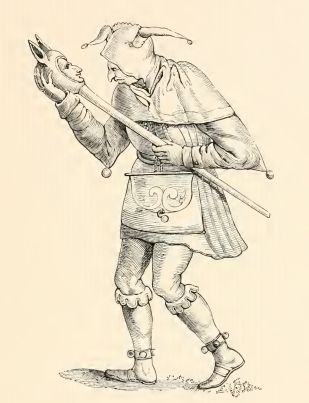 |
| A Godless Heathen |
They interrupt the service, collect money
from the congregation (which they will later spend on drink), distribute
special badges
“… thefe they give to every one that wil give money for them to maintaine them in their hethenrie, divelrie, whordome, drunkennes, pride, and what not.”
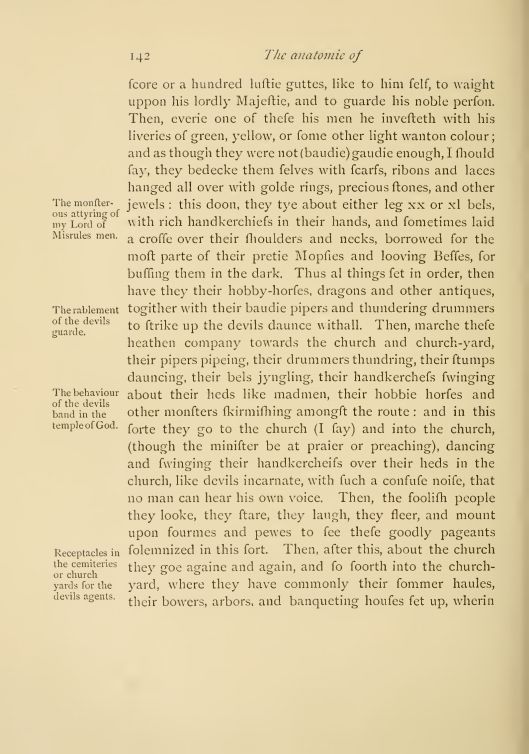 |
| Phillip Stubbes - The Anatomie of Abuses - 1583 |
Once again, it was the Romans who were blamed for this, with
their Saturnalia celebrations, when a lowly citizen or even a slave would be
elevated to the position of the Lord of Misrule and presided over the
celebrations, his word carrying as much authority as a real Lord. The practice
was carried on in the courts of the English kings, an especially sumptuous
Christmas being held in 1348, by King Edward III. A Lord of Misrule was
appointed and given the title ‘Master of Merry Disports’, who organised and
ruled over all the games, masques, disguisings and dances.
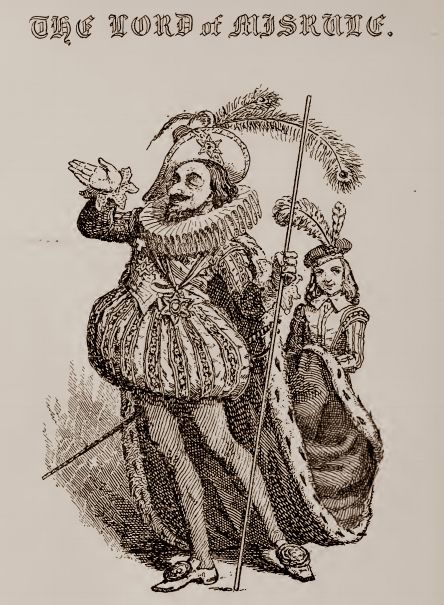 |
| The Lord of Misrule |
The duties of the
Lords of Misrule varied, as did the length of their term of office, but in
general they ruled over the twelve days of Christmas and commanded that all
should participate and be merry, with no one sitting apart and refusing to join
the revels. The nobles followed suit in their own households, the Mayor of
London gave over control to a Lord of Misrule, as did the Inns of Court, and
the office was even mentioned in the original draft of statute founding Trinity
College, Cambridge in 1546.
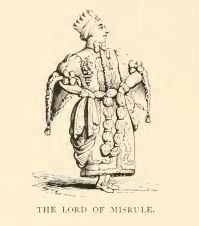 |
| The Lord of Misrule |
In the early years of his reign, the young King
Henry VIII, before he became swayed by flattery and sycophancy, loved the
Christmas festivities and delighted in pageants, masques and merry-making. His
first Christmas at Richmond was governed by a Lord of Misrule, who was paid £8
6s 8d, and this sum was increased in later years to £15 6s 8d.
 |
| The Lord of Misrule's Procession |
The
conceit of the Lord of Misrule extended to the provision of costly robes of
office, as rich as the King’s own, and the establishment of a mock court,
replete with a chancellor, treasurer, gentleman-ushers, pages of honour,
sergeants-at-arms, footmen, messengers, trumpeters, heralds, jugglers, tumblers
and fools. But the election of the Lord was not reserved to the high and
mighty, as each lowly community would appoint its own Lord to rule over the
festivities and keep things cracking along, with entertainment for all.
 |
| The Lord and his Jester |
There
is a strange wisdom in this, similar to that of the court jester who may, with
impunity, point a finger at pomp and self-importance and utter a wholesome
truth when others held their fearful tongues. Turning things on its head was a
valuable moral lesson, and the Lord of Misrule gave even the lowliest the
command and the permission to be merry for even a short while; indeed, one of
his first commands was to absolve all present of their wisdom and they were to
be just wise enough to make fools of themselves.
 |
| The Lord of Misrule |
In Scotland, the position was
taken by the Abbot of Unreason, who performed a similar purpose, if not quite
as enthusiastically as his English counterparts, until an ordinance by the
Scottish legislature in 1555 suppressed all the annual burlesques of this sort.
 |
| Misrule in action |
In England, the festivities went the way of the monarchy under the Commonwealth
and although Charles II attempted to revive them at his court after the
Restoration, they never assumed the splendour and importance of earlier
Christmases and eventually the reign of the Lord of Misrule passed away.
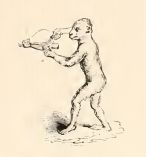 |
| A Cheeky Monkey |
... and a Happy New Year to you all.
No comments:
Post a Comment